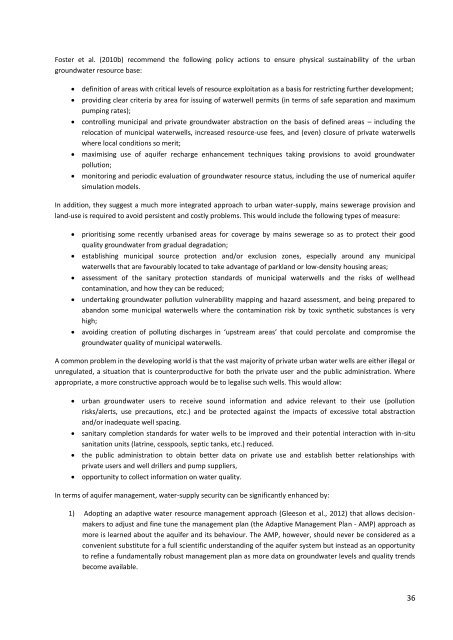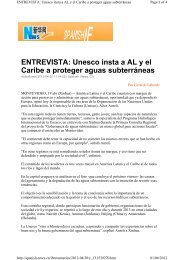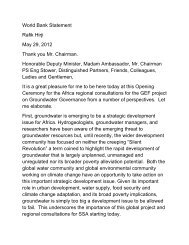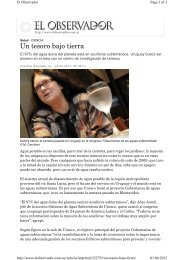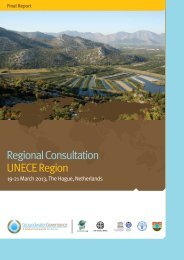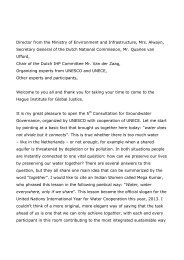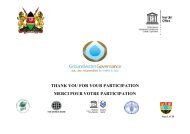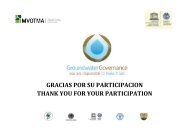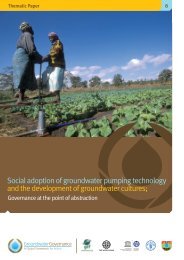Thematic paper 3: Urban-rural tensions - Groundwater Governance
Thematic paper 3: Urban-rural tensions - Groundwater Governance
Thematic paper 3: Urban-rural tensions - Groundwater Governance
Create successful ePaper yourself
Turn your PDF publications into a flip-book with our unique Google optimized e-Paper software.
Foster et al. (2010b) recommend the following policy actions to ensure physical sustainability of the urbangroundwater resource base: definition of areas with critical levels of resource exploitation as a basis for restricting further development; providing clear criteria by area for issuing of waterwell permits (in terms of safe separation and maximumpumping rates); controlling municipal and private groundwater abstraction on the basis of defined areas – including therelocation of municipal waterwells, increased resource-use fees, and (even) closure of private waterwellswhere local conditions so merit; maximising use of aquifer recharge enhancement techniques taking provisions to avoid groundwaterpollution; monitoring and periodic evaluation of groundwater resource status, including the use of numerical aquifersimulation models.In addition, they suggest a much more integrated approach to urban water-supply, mains sewerage provision andland-use is required to avoid persistent and costly problems. This would include the following types of measure: prioritising some recently urbanised areas for coverage by mains sewerage so as to protect their goodquality groundwater from gradual degradation; establishing municipal source protection and/or exclusion zones, especially around any municipalwaterwells that are favourably located to take advantage of parkland or low-density housing areas; assessment of the sanitary protection standards of municipal waterwells and the risks of wellheadcontamination, and how they can be reduced; undertaking groundwater pollution vulnerability mapping and hazard assessment, and being prepared toabandon some municipal waterwells where the contamination risk by toxic synthetic substances is veryhigh; avoiding creation of polluting discharges in ‘upstream areas’ that could percolate and compromise thegroundwater quality of municipal waterwells.A common problem in the developing world is that the vast majority of private urban water wells are either illegal orunregulated, a situation that is counterproductive for both the private user and the public administration. Whereappropriate, a more constructive approach would be to legalise such wells. This would allow: urban groundwater users to receive sound information and advice relevant to their use (pollutionrisks/alerts, use precautions, etc.) and be protected against the impacts of excessive total abstractionand/or inadequate well spacing. sanitary completion standards for water wells to be improved and their potential interaction with in-situsanitation units (latrine, cesspools, septic tanks, etc.) reduced. the public administration to obtain better data on private use and establish better relationships withprivate users and well drillers and pump suppliers, opportunity to collect information on water quality.In terms of aquifer management, water-supply security can be significantly enhanced by:1) Adopting an adaptive water resource management approach (Gleeson et al., 2012) that allows decisionmakersto adjust and fine tune the management plan (the Adaptive Management Plan - AMP) approach asmore is learned about the aquifer and its behaviour. The AMP, however, should never be considered as aconvenient substitute for a full scientific understanding of the aquifer system but instead as an opportunityto refine a fundamentally robust management plan as more data on groundwater levels and quality trendsbecome available.36


